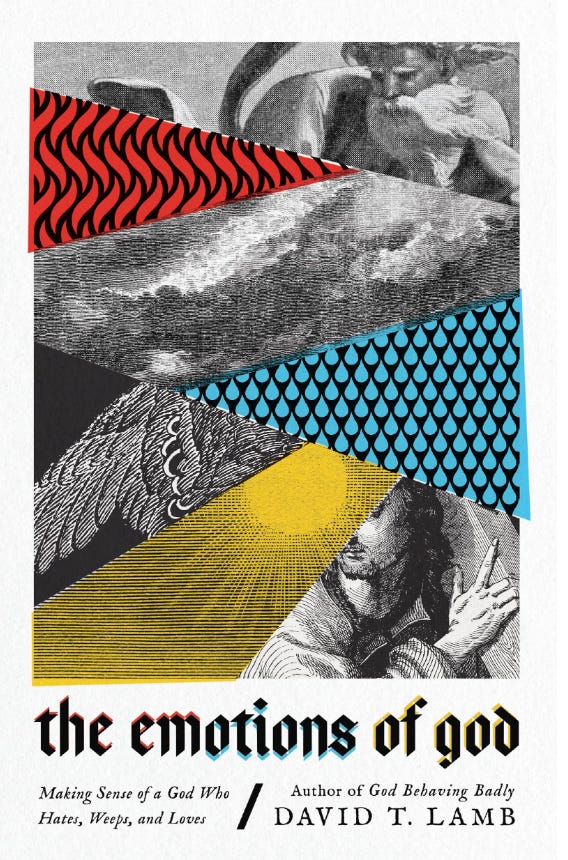Nearly everyone (or even more than that) knows love but very few can define it, and most definitions of love fall short of the love we know. David Lamb devotes a chapter to love as an emotion of God in his book, The Emotions of God: Making Sense of a God Who Hates, Weeps, and Loves. This is our last post on this excellent book. I hope you find a way to use it in your church or small group study. He frames love as a “long-term affection over the course of a relationship.” As many of you may know, I have defined love with the terms “rugged, affective commitment” to another person.
The God of the Bible is a God of many emotions, including love.
His format has been briefly to map the terms used of God’s love:
Hesed: “In a surge of anger, I hid my face from you for a moment, but with everlasting kindness I will have compassion on you,” says the LORD your Redeemer (Isa 54:8).
Ahav: The LORD appeared to us in the past, saying: “I have loved you with an everlasting love; I have drawn you with unfailing kindness” (Jer 31:3).
Hasaq: “Yet the LORD set his affection on your ancestors and loved them, and he chose you, their descendants, above all the nations—as it is today” (Deut 10:15).
Phileō: “Those whom I love I rebuke and discipline. So be earnest and repent” (Rev 3:19).
Agapē: “As the Father has loved me, so have I loved you. Now remain in my love” (John 15:9).
Agapaō: “he Father loves the Son and has placed everything in his hands” (John 3:35).
When Joseph, the patriarch, was in prison God’s hesed was with him (Gen 39:21) though it didn’t “solve” his problem. Rather, God was present with Joseph in his problems.
Here is one of the Bible’s classic God-loves-us passages, and it uses three different love-words for God:
Deut. 7:7 The LORD did not set his affection on you and choose you because you were more numerous than other peoples, for you were the fewest of all peoples. 8 But it was because the LORD loved you and kept the oath he swore to your ancestors that he brought you out with a mighty hand and redeemed you from the land of slavery, from the power of Pharaoh king of Egypt. 9 Know therefore that the LORD your God is God; he is the faithful God, keeping his covenant of love to a thousand generations of those who love him and keep his commandments. (hasaq, ahav, hesed).
God’s love is gracious in the sense of incongruity; God loves us because God is a God who loves; God loves those who love God and God remains faithful.
Psalm 23:6 reads, “Surely your goodness and love will follow me all the days of my life and I will dwell in the house of the LORD forever.” David drills down a bit on the word “follow” which means more chases, pursues, and hunts us!
God’s love disciplines, too. Proverbs 3:11-12:
My son, do not despise the LORD’S discipline,
and do not resent his rebuke,
because the LORD disciplines those he loves,
as a father the son he delights in.
Which explains the love-rebukes of Jesus, which happen not a few times in the Gospels and chapters 2-3 in Revelation, which remember has nothing to do with 1948.
But Jesus loved others, and a touching scene is found in the story of the rich young ruler, where these words jump up and ask for our attention:
“Teacher,” he declared, “all these I have kept since I was a boy.”
Jesus looked at him and loved him. “One thing you lack,” he said. “Go, sell everything you have and give to the poor, and you will have treasure in heaven. Then come, follow me.”
At this the man’s face fell. He went away sad, because he had great wealth.
Jesus looked around and said to his disciples, “How hard it is for the rich to enter the kingdom of God!” (Mark 10:20-23).
And what text tells us more about the manifestations in real life than 1 Cor 13:4-7? “Love is patient, love is kind. It does not envy, it does not boast, it is not proud. 5 It does not dishonor others, it is not self-seeking, it is not easily angered, it keeps no record of wrongs. 6 Love does not delight in evil but rejoices with the truth. 7 It always protects, always trusts, always hopes, always perseveres.”
What a wonderful chapter, and you will have to read the last section about his mom and dad. I won’t spoil it.






It's on my list thanks to your review. I liked the idea of using it in a small group setting.